Japanese Numbers // Your Complete Guide (With Quiz Included)
Learn How To Count in Japanese 🔢 Your Guide to Japanese Numbers
Once you have learned the three Japanese alphabets, your next challenge is to learn Japanese numbers!
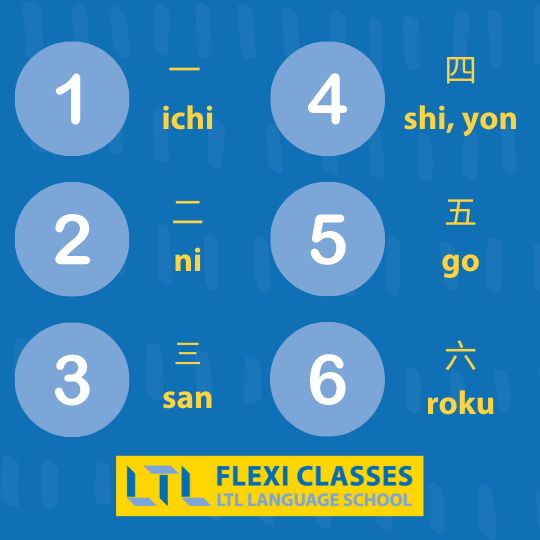
DO NOT WORRY – learning Japanese numbers is not so difficult. Learning the numbers in Japanese can also open up some unexpected doors.
DID YOU KNOW – when you’ve learned the Japanese numbers you essentially know the months of the year in Japanese!
Unlike in English where each month is a completely different word, in Japanese months follow the numbers from 1 to 12, with an additional word to denote the month at the end.
Anyway we’ll reveal more about that later on!
Japanese Numbers – AN IMPORTANT NOTE TO START
Japanese Numbers – 1-10
Japanese Numbers – 11-20
Japanese Numbers – 21-100
Japanese Numbers – Above 100
Japanese Numbers – Above 1,000
Japanese Numbers – Months in Japanese
BONUS FREEBIE – FREE QUIZ
Japanese Numbers – FAQ’s
Japanese Numbers – AN IMPORTANT NOTE
First of all, you should know that there are two ways to write number in Japanese.
Of course, the numbers you know and love already are the most typical. 1, 2, 3, 4, 5 and so on!
HOWEVER – there are also Kanji (一, 二, 三…) that are applicable for every number.
So essentially the number one can be written as 1 or 一 (think of when you write “one” out using the English alphabet – that’s the same as using Kanji!
While standard numbers are basically used to count something, like “100円” (hyaku-en = 100yen) and “5歳” (go-sai = 5 years old), Kanji numbers are used mainly for nouns and idioms that include numbers partly, like “四国” (shi-koku = one of the regions in western Japan) and “一部” (ichi-bu = a part).
In addition, in terms of big numbers, Kanji numbers are so convenient.
Why?
Think about when you want to write a big number like ONE BILLION, that would be 1,000,000,000. That’s a lot of zeroes!
Instead you can write 10億 / 十億. That’s much easier right?!
In Kanji you can save your energy and forget about writing lots of long numbers.
Anyway big numbers are coming later. For now let’s focus on the basics of Japanese numbers.
Japanese Numbers – 1 to 10
Here are the Japanese numbers from 1-10.
DID YOU KNOW – if you already know Mandarin Chinese, the numbers in Kanji are EXACTLY the same. Lucky you!
Just remember the pronunciation differs across both languages (apart from the number 3 which is the same)!
| Number | Kanji | Pronunciation |
|---|---|---|
| 0 | 零 | rei, zero, maru |
| 1 | 一 | ichi |
| 2 | 二 | ni |
| 3 | 三 | san |
| 4 | 四 | shi / yon |
| 5 | 五 | go |
| 6 | 六 | roku |
| 7 | 七 | shichi / nana |
| 8 | 八 | hachi |
| 9 | 九 | kyuu / ku |
| 10 | 十 | juu |
As you see, some of them have multiple pronunciations.
In some situations, either one is correct, but in many situations, only one of them is applicable. We’ll come to that more shortly.
The best way to remember those correctly is… to practice, practice, and practice.
🤳 If you’re learning numbers to give out your contact details to friends, coworkers or potential dates, remember that Japanese people say Moshi Moshi when answering the phone!

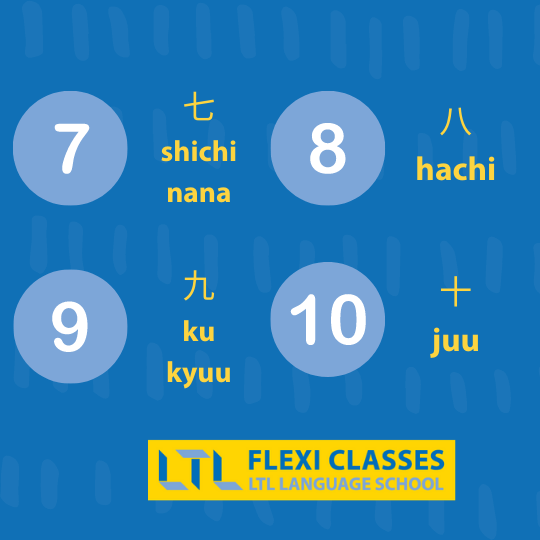
Those second pronunciations were created because of “avoided words” that sound like something unfortunate.
For example originally, 4 was pronounced as (shi).
However, there is another word in Japanese that is 死 (shi).
This word means death, very similar to Chinese. 7 (shichi) also sounds similar to death, and 9 (ku) sounds like 苦 (ku) that means suffering.
Therefore, people preferred to use an alternate pronunciation.
Usually people do not hesitate to pronounce those avoided numbers, but still, most hotels and apartments in Japan do not have room numbers ending with 4 and 9 because of that traditional reason.

Japanese Numbers – 11 to 20
Now let’s start to see the patterns developing within the Japanese numbers. You’ll discover it’s not all that hard at all.
There are no teens in Japanese like in English so 11-20 is very similar to 1-10.
Here is 11-20 in Japanese.
| Number | Kanji | Pronunciation |
|---|---|---|
| 11 | 十一 | juu-ichi |
| 12 | 十二 | juu-ni |
| 13 | 十三 | juu-san |
| 14 | 十四 | juu-shi / juu-yon |
| 15 | 十五 | juu-go |
| 16 | 十六 | juu-roku |
| 17 | 十七 | juu-shichi / juu-nana |
| 18 | 十八 | juu-hachi |
| 19 | 十九 | juu-ku / juu-kyuu |
| 20 | 二十 | ni-juu |
Japanese Numbers – 21 to 100
All the way up to 100, the story remains similar. Once you know 1-10 in Japanese numbers, the rest is rinse and repeat.
Here are the Japanese numbers from 21-100.
IMPORTANT – you’ll have noticed the numbers 4, 7 and 9 have two different pronunciations. Which should you use when counting?
- 4 | yon takes preference
- 7 | nana takes preference
- 9 | kyuu takes preference
| Number | Kanji | Pronunciation |
|---|---|---|
| 21 | 二十一 | ni-juu-ichi |
| 22 | 二十二 | ni-juu-ni |
| 23 | 二十三 | ni-juu-san |
| 24 | 二十四 | ni-juu-shi / ni-juu-yon |
| 25 | 二十五 | ni-juu-go |
| 26 | 二十六 | ni-juu-roku |
| 27 | 二十七 | ni-juu-shichi / ni-juu-nana |
| 28 | 二十八 | ni-juu-hachi |
| 29 | 二十九 | ni-juu-ku / ni-juu-kyuu |
| 30 | 三十 | san-juu |
| 31 | 三十一 | san-juu-ichi |
| 32 | 三十二 | san-juu-ni |
| 33 | 三十三 | san-juu-san |
| 34 | 三十四 | san-juu-shi / san-juu-yon |
| 35 | 三十五 | san-juu-go |
| 36 | 三十六 | san-juu-roku |
| 37 | 三十七 | san-juu-shichi / san-juu-nana |
| 38 | 三十八 | san-juu-hachi |
| 39 | 三十九 | san-juu-ku / san-juu-kyuu |
| 40 | 四十 | shi-juu / yon-juu |
| 41 | 四十一 | yon-juu-ichi |
| 42 | 四十二 | yon-juu-ni |
| 43 | 四十三 | yon-juu-san |
| 44 | 四十四 | yon-juu-yon |
| 45 | 四十五 | yon-juu-go |
| 46 | 四十六 | yon-juu-roku |
| 47 | 四十七 | yon-juu-shichi / yon-juu-nana |
| 48 | 四十八 | yon-juu-hachi |
| 49 | 四十九 | yon-juu-ku / yon-juu-kyuu |
| 50 | 五十 | go-juu |
| 51 | 五十一 | go-juu-ichi |
| 52 | 五十二 | go-juu-ni |
| 53 | 五十三 | go-juu-san |
| 54 | 五十四 | go-juu-yon / go-juu-shi |
| 55 | 五十五 | go-juu-go |
| 56 | 五十六 | go-juu-roku |
| 57 | 五十七 | go-juu-shichi / go-juu-nana |
| 58 | 五十八 | go-juu-hachi |
| 59 | 五十九 | go-juu-ku / go-juu-kyuu |
| 60 | 六十 | roku-juu |
| 61 | 六十一 | roku-juu-ichi |
| 62 | 六十二 | roku-juu-ni |
| 63 | 六十三 | roku-juu-san |
| 64 | 六十四 | roku-juu-yon / roku-juu-shi |
| 65 | 六十五 | roku-juu-go |
| 66 | 六十六 | roku-juu-roku |
| 67 | 六十七 | roku-juu-shichi / roku-juu-nana |
| 68 | 六十八 | roku-juu-hachi |
| 69 | 六十九 | roku-juu-ku / roku-juu-kyuu |
| 70 | 七十 | shichi-juu / nana-juu |
| 71 | 七十一 | nana-juu-ichi |
| 72 | 七十二 | nana-juu-ni |
| 73 | 七十三 | nana-juu-san |
| 74 | 七十四 | nana-juu-yon / nana-juu-shi |
| 75 | 七十五 | nana-juu-go |
| 76 | 七十六 | nana-juu-roku |
| 77 | 七十七 | nana-juu-nana |
| 78 | 七十八 | nana-juu-hachi |
| 79 | 七十九 | nana-juu-ku / nana-juu-kyuu |
| 80 | 八十 | hachi-juu |
| 81 | 八十一 | hachi-juu-ichi |
| 82 | 八十二 | hachi-juu-ni |
| 83 | 八十三 | hachi-juu-san |
| 84 | 八十四 | hachi-juu-yon / hachi-juu-shi |
| 85 | 八十五 | hachi-juu-go |
| 86 | 八十六 | hachi-juu-roku |
| 87 | 八十七 | hachi-juu-nana / hachi-juu-shichi |
| 88 | 八十八 | hachi-juu-hachi |
| 89 | 八十九 | hachi-juu-ku / hachi-juu-kyuu |
| 90 | 九十 | kyuu-juu |
| 91 | 九十一 | kyuu-juu-ichi |
| 92 | 九十二 | kyuu-juu-ni |
| 93 | 九十三 | kyuu-juu-san |
| 94 | 九十四 | kyuu-juu-yon / kyuu-juu-shi |
| 95 | 九十五 | kyuu-juu-go |
| 96 | 九十六 | kyuu-juu-roku |
| 97 | 九十七 | kyuu-juu-nana / kyuu-juu-shichi |
| 98 | 九十八 | kyuu-juu-hachi |
| 99 | 九十九 | kyuu-juu-ku / kyuu-juu-kyuu |
| 100 | 百 | hyaku |
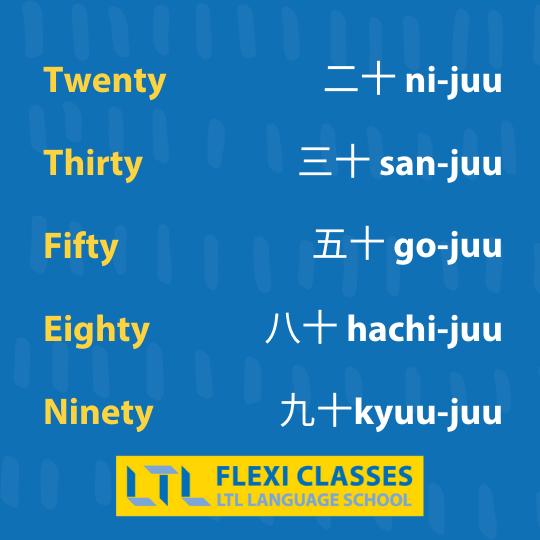
So you can see Japanese numbers from 1-100 really are not too hard.
You just need your first number, the multiple of ten, then the singular number all pushed together!
Even with bigger numbers in Japanese, it’s not all that bad either.
We’ll come to that shortly.
Japanese Numbers – Above 100
The theme is very much the same and not too taxing.
There are just a few pronunciation differentials to be aware of now, but otherwise you can continue to build Japanese numbers very easily, even over 100.
| Number | Kanji | Pronunciation |
|---|---|---|
| 101 | 百一 | hyaku-ichi |
| 110 | 百十 | hyaku-juu |
| 111 | 百十一 | hyaku-juu-ichi |
| 120 | 百二十 | hyaku-ni-juu |
| 130 | 百三十 | hyaku-san-juu |
| 200 | 二百 | ni-hyaku |
| 300 | 三百 | san-byaku |
| 400 | 四百 | yon-hyaku |
| 500 | 五百 | go-hyaku |
| 600 | 六百 | ropp-yaku |
| 700 | 七百 | nana-hyaku |
| 800 | 八百 | happ-yaku |
| 900 | 九百 | kyuu-hyaku |
| 1,000 | 千 | sen |
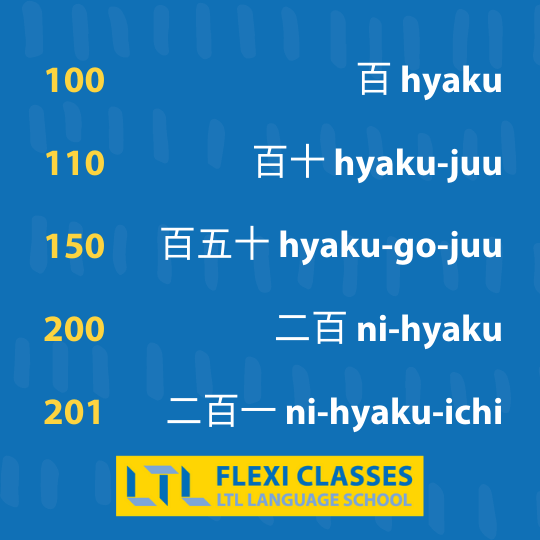
So we mentioned some slight kinks in the pronunciation above.
In the table we highlighted them for you but here is a summary:
- 300 in Japanese would not read as san-hyaku, but san-byaku.
- 600 in Japanese would not read as roku-hyaku but ropp-yaku.
- 800 in Japanese would not read hachi-hyaku or shichi-hyaku but happ-yaku.
The idea is that pronunciation is a little easier this way. If you look at the incorrect versions, they are a little bit of a mouthful

How To Learn Katakana (カタカナ) // Essential Things To Know
How to Learn Katakana? | Katakana is one of Japanese’s three alphabets. Katakana are generally more angular looking than Hiragana and focuses on loanwords.
Japanese Numbers – Above 1,000
For those of you who love their numbers, we dedicate this section to you… as we go into the crazy realms of BIG JAPANESE NUMBERS!
We’ll be honest, most of us struggled with the English for some of these!
| Number | Kanji | Pronunciation |
|---|---|---|
| 1,001 | 千一 | sen-ichi |
| 1,100 | 千百 | sen-hyaku |
| 2,000 | 二千 | ni-sen |
| 10,000 | 一万 | ichi-man |
| 100,000 | 十万 | juu-man |
| 1,000,000 | 百万 | hyaku-man |
| 10,000,000 | 千万 | sen-man |
| 100,000,000 | 一億 | ichi-oku |
| 1,000,000,000 (One Billion) | 十億 | juu-oku |
| 10,000,000,000 (Ten Billion) | 百億 | kyaku-oku |
| 100,000,000,000 (A Hundred Billion) | 千億 | sen-oku |
| 1,000,000,000,000 (A Trillion) | 一兆 | ic-chou |
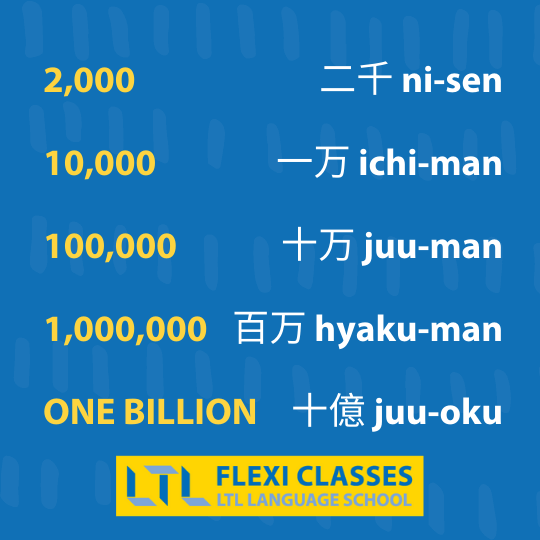
I think you’ll never need to exceed a trillion in Japanese numbers but if you do, you certainly know the formula!
There are some important things to understand when numbers in Japanese get large though.
In Japanese, the way to divide numbers from 10,000 are a little bit different from in English.
EXAMPLE – Let’s take 10,000. In Japanese this is read as ichi-man.
What can we deduce from this?

- ichi means 1
- man means 10,000
Now in English we say ten thousand – essentially ten of a thousand.
In Japanese however, the same with Chinese by the way, numbers are divided not by 3 commas per “measure word” but by four commas.
What do we mean by measure words? Look at it this way… In English we use:
- Tens
- Hundreds
- Thousands
- Millions etc
In Japanese though, we also have our own measure word for one ten thousand which is 万 (man).
This means when we read 10,000 it’s actually 1 man or ichi-man and not juu-sen (ten thousands). This doesn’t exist.
It might seem complex and rather odd at first but it’s really quite easy once you understand it and practice some examples.
FOR EXAMPLE – 100,000 in English is one hundred x thousands… but in Japanese because we have the 10,000 measure word 万 (man) we can use this and make the word juu-man (ten x ten thousands).
One million in English is read as a hundred ten thousands in Japanese… and so on.
NOTE – that doesn’t mean we write numbers with 4 comma spaces. As 3 comma spaces is the international standard, we still adhere to this in Japanese.
Japanese Numbers – Months in Japanese
Now whilst you’d think months and numbers wouldn’t be related in words (think most other languages, there is no relation). Yet oddly enough, in many Asian languages there is a clear correlation.
This is what makes things like months of the year in Japanese really easy to learn.
If you know 1-12 you inexplicably already know the months!
How? Let’s show you now.
First we need to teach you the word 月 gatsu which means month in Japanese.
Now we are ready:
| Month | Japanese | Characters |
|---|---|---|
| January | ichi-gatsu | 一月 |
| February | ni-gatsu | 二月 |
| March | san-gatsu | 三月 |
| April | shi-gatsu | 四月 |
| May | go-gatsu | 五月 |
| June | roku-gatsu | 六月 |
| July | shichi-gatsu | 七月 |
| August | hachi-gatsu | 八月 |
| September | ku-gatsu | 九月 |
| October | juu-gatsu | 十月 |
| November | juuichi-gatsu | 十一月 |
| December | juuni-gatsu | 十二月 |
How easy is that? The months in Japanese are essentially the Japanese numbers 1-12 with gatsu added onto the end.
Whilst Japanese is undoubtably difficult for many westerners to learn it’s lessons like these which can make the mental challenge of the language feel far lighter.
There are many elements of Japanese that acquire this sort of logic.
Whilst we have drawn many comparisons to Chinese Mandarin so far today (the months again are the same in Mandarin) unfortunately the days of the week do not follow suit!
In Mandarin Chinese the days follow a similar pattern – using the numbers 1-7 and then adding on the word for day.
Interestingly in Japanese the elements are used (think water, fire and metal)…! It’s actually very intriguing to learn but that lesson is for another day!
DID YOU KNOW – Originally, Japanese also had unique names for every month like in English, but today most Japanese people do not use them at all.
Even though the Japanese language is thought as one of the most difficult languages in the world, it is not in terms of numbers.
As long as you know the Japanese numbers, you can order at a restaurant and enjoy shopping even without using some other complicated phrases.
Learning Japanese numbers is a little step, that yields great rewards…
If numbers and Asian languages are your thing why not check out our super guide on Chinese numbers also, you’ll be surprised how much the two cross over.
Now it’s time to put you to the test!
Japanese Numbers – FREE QUIZ
Feeling brave enough to test out your Japanese number skills?
We’ve prepared a quick-fire 20 question quiz for you to try.
Don’t worry it’s super quick, every question is multiple choice, and results are instantly delivered on this page!
Can you nail the full 20? Good luck and share your results in the comments if you wish!
If you love the wonderful world of numbers like we do, why not check out our guides on Chinese numbers, Korean numbers, Russian numbers and Vietnamese numbers also?
Japanese Numbers – FAQ’s
What is 1, 2, 3 in Japanese?
The written Kanji for 1, 2 and 3 in Japanese couldn’t be simpler! The pronunciation is in brackets
1 /一【ichi】
2/二【ni】
3/三【san】
Interestingly the numbers in Japanese mirror that of Chinese Mandarin.
Why do some Japanese numbers have two pronunciations?
Those second pronunciations were created because of “avoided words” that sound like something unfortunate.
For example originally, 4 was pronounced as【shi】.
However, there is another word in Japanese that is 死【shi】.
This word means death, very similar to Chinese. 7【shichi】also sounds similar, and 9【ku】sounds like 苦【ku】that means suffering.
Therefore, people preferred to use an alternate pronunciation.
Usually people do not hesitate to pronounce those avoided numbers, but still, most hotels and apartments in Japan do not have room numbers ending with 4 and 9 because of that traditional reason.
What is 100 in Japanese?
100 in Japanese is 百 which is spoken as hyaku.
What is 10 in Japanese?
10 in Japanese is 十 which is spoken as juu.
Are there any Japanese numbers with irregular pronunciation?
Not many but there are some to note which include:
300 in Japanese would not read as san-hyaku, but san-byaku.
600 in Japanese would not read as roku-hyaku but ropp-yaku.
800 in Japanese would not read hachi-hyaku or shichi-hyaku but happ-yaku.
What are the two ways of pronouncing the number 4 in Japanese?
The number four in Japanese can be spoken as shi or yon.
Generally if one takes a preference it’d be the latter, yon.
What are the two ways of pronouncing the number 7 in Japanese?
7 can be spoken as shichi or nana in Japanese.
nana takes preference generally.
Want More From LTL?
WANT TO LEARN JAPANESE? Check out our online Japanese courses here.
We offer a 7-day free trial to all new students where you can study 24/7.
What about studying Japanese in Japan instead? We’ve got your back. Our Japanese courses in Tokyo can either be taken in small groups of no more than 5 students or individually for a more tailored experience.
We even offer incredible homestay experiences in Tokyo as well.
Come and be a part of this amazing community.










8 comments
一 二 三
so easy!
Right!!
That's a great guide. I got 100% in the quiz!!
Wow, nailed it Gerard!
Great guide, funny it's the same as Chinese with the Hanzi but spoken so differently
一二三四。。。!
You accidentally put 500 down as "juu-ku / juu-kyuu"
Great spot, fixed!